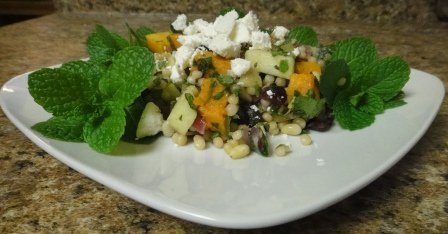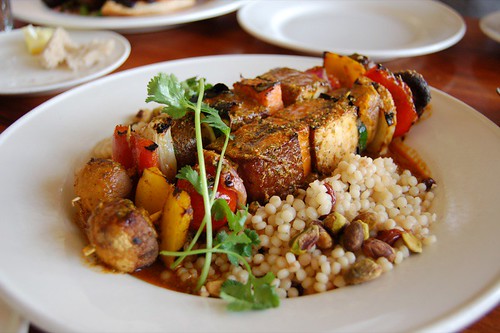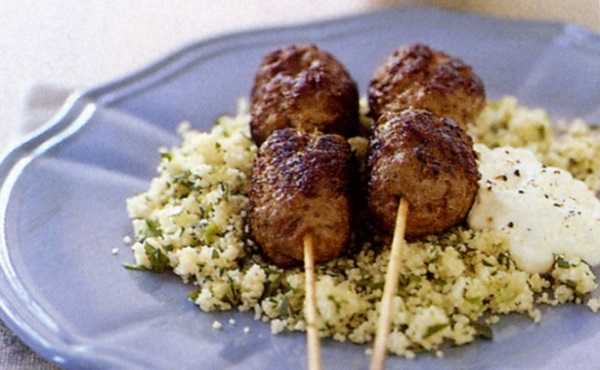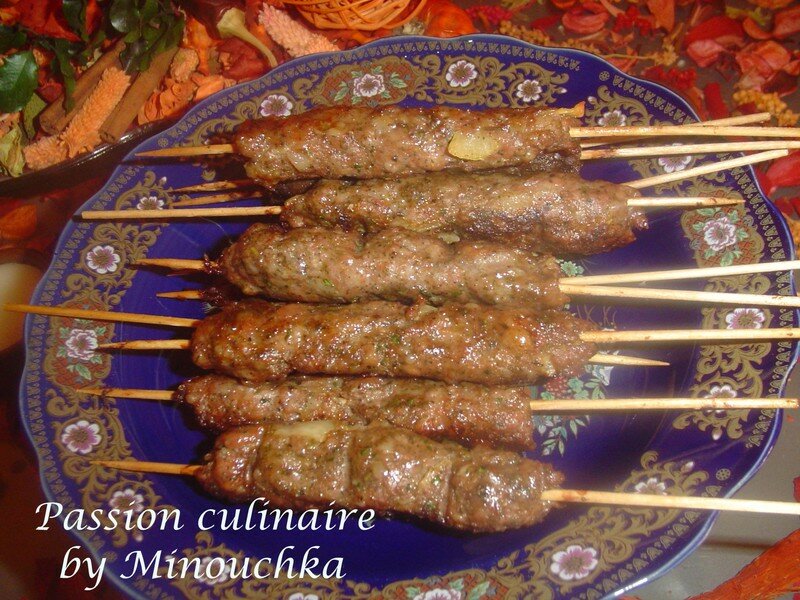Moroccan cuisine today is a reflection of the colorful past of the country, mixed with the culinary traditions of two Berber Arabs and its. Over time, these influences have been refined into a Moroccan flavor - largely due to centuries of imperial dynasties, where the expectations and demands weighed heavily on the heads of the royal court, and thus inspired both the experimentation and extravagance.

Moroccan cuisine is strongly characterized by the subtle blend of spices, and Moroccans cleverly used to enhance, rather than mask the flavor and fragrance of their dishes. Spices such as cayenne pepper, saffron, pepper, cinnamon, turmeric, ginger, cumin, paprika and black pepper are common in Morocco, is a special blend of spices known as ras el hanout, translated as "head of the shop", which is usually a mixture of between 10 and 30 different spices. Traditionally, the owner of each spice shop sold its own unique - and secret - ras el hanout recipe. Fresh herbs are also present in Moroccan dishes, including garlic, coriander, parsley, mint, as well as additions fragrant like orange or rose water, olives and olive oil. Harissa, a paste of fire garlic, chilli, olive oil and salt, is often used as a condiment. Before anything else, perhaps the defining characteristic of Moroccan cuisine is a mixture of savory with sweet, more commonly known by the addition of fresh meat tagines.

Moroccan cuisine is mainly believed, producing a wide range of fruits, vegetables, nuts and grains, as well as large quantities of sheep, cattle, poultry and seafood This range of seasonal and mostly organic is widely cultivated and grown by small farmers and delivered daily to markets and bazaars across the country.
Eating in Morocco is a social ritual and sharing meals at home is essential for most Moroccans way of life. Families are very proud of all aspects of a meal, buy fresh preparation, cooking and display each dish. Such is the importance of the meal that many urban families even employ a live-in cook - sometimes a poorer family relation - to strengthen their social position. Most houses also employ host country full-time leaders encourage residents and non-residents at their doors. This has resulted in a high number of quality restaurants located throughout the country, as well as a new wave of international fusion cuisine and Morocco.
Food
To get you started, here is a list of common Moroccan food you will certainly encounter during your travels:
amlou: sweet spread made from marzipan, honey and argan oil
baghrir: Sponge pancake with small pockets in the open air on the top, like a great crumpet
Kebab skewers of grilled meat on a charcoal fire
couscous hand rolled grains of semolina steamed until soft and plump
Harira soup usually made from vegetable or chicken broth with chickpeas and tomatoes added
kefta: ground lamb or beef spicy and generous is rolled into the shape of a sausage skewer or formed into patties and cook in a tajine
khalli: poached egg, sometimes cooked and served in a tajine
Khubz: round, flat loaf of bread
barbecue: whole roasted lamb or beef
msemmen: thin, fat, flat bread
pastilla: pastry, phyllo pastry with a savory filling of chicken, pigeon, or sometimes seafood, topped with icing sugar or cinnamon
Tagine meat, seafood and / or vegetable casserole or stew, cooked slowly in a container in two pieces with lid earthenware cooking cone-shaped
tanjia: terracotta urn stuffed with seasoned meat and cooked slowly in the embers of the local hammam
Zaalouk: spicy eggplant dip
Breads and Breakfast - Morocco's culinary start in the morning. Even the most basic of coffee will usually offer fresh pastries or breads to accompany your coffee, tea, or orange juice freshly squeezed. Baguettes, croissants and pain au chocolat are the backbone of most breakfasts, but you can also meet Moroccan breads - best eaten fresh - as Khubz, msemmen, and baghrir. A personal favorite is smothered in hot baghrir amlou. If you are staying in a house in the country host breakfast will probably also a selection of jams, preserves, or yogurt and fresh fruit and boiled eggs and omelettes.

Sandwiches and snacks - Snak restaurants can be found throughout Morocco, from hole-in-the-wall floor specials to larger, sit-down establishments. Dishes ranging from sandwiches, pizzas, chips and French fries () to shawarma (grilled meat in pita bread) and more substantial dishes such as kebabs. Moroccan sandwich version comes in either a stick or Khubz, and usually involves selection from a displayed selection of meats, salads and sauces; ask dishes away if you want a takeaway. Boiled snails - not the French variety, but small brown and cream striped snail known as slipper - are usually sold in street stalls and a bowl of soup snail is considered a great restorative. Harira soup is another, and can be eaten alone or as part of a big meal. During Ramadan, Harira is often drunk at dusk to break the fast. There are many recipes for harira, the base stock, including chickpeas and tomatoes, beans and pasta or chicken and pepper. I recommend a squeeze of lemon juice to add a bit of sharpness to taste.
Salads - The abundance of fresh fruits and vegetables throughout Morocco - even on the edge of the dunes of the Sahara - lends itself to a variety of delicious salads. Almost everywhere you will be offered a Moroccan salad (chopped tomatoes, cucumber and green pepper sometimes), or at least a green salad of lettuce and tomatoes. Vegetarians prefer the salad course offered by many fine restaurants called meze. This mix of dishes may include eggplant dip called Spicy Zaalouk, small potatoes with herbs, honey carrots, pumpkin with cinnamon and roasted tomato relish.
Seafood - Atlantic coast of Morocco, including the disputed territory of Western Sahara, is a popular fishing spot, and for good reason. The cold, nutrient-rich waters have always provided the country's markets and restaurants with a wide range of seafood throughout the year. Recently, however, there was a decrease in daily, largely due to overfishing. However, on any given day along the coast and in the inland cities with major transport refrigeration, you are still likely to be spoiled for choice with fresh catches of Saint-Pierre (St. Peter), sea bream (sea bream), whiting (whiting), and sardines. Oyster Oualidia ensure a steady supply of domestic mollusk popular, shrimp (prawns / shrimp) and lobster (lobster) are also regularly featured in the menus.

Meat - Moroccans love their meat, and the concept of vegetarianism causes looks of confusion among the locals, who assume that the seafood will still eat, where one is usually provided vegetarian salad with tuna. Lamb is favored and savored with couscous, tagines in, skewers over charcoal, braised, boiled, roasted or slow until deliciously soft to barbecue. Beef and chicken are more affordable and are also served in a variety of ways, including roasted chicken flame-grilled, meal snak popular.
Couscous - either native Algeria or Morocco in the 13th century, the couscous - the national dish of Morocco - is a fine grain semolina which is traditionally hand-rolled before being steamed over a stew simmering. Ready when plump and soft, the beans are then packed into a large plate or dish tagine, with the stew, then piled on top. It is traditionally served after a tagine or barbecue, and the dish is the culmination of many Moroccans who judge a meal. If you are invited to a Moroccan couscous for the traditional Friday afternoon, know that every woman or man Moroccan mother the best cook couscous in Morocco, and the state is also comparable to treason.
Pastilla - Sometimes called bisteeya, it is a paste made of sweet and savory shredded chicken or pigeon egg and mixed with crushed almonds. The mixture is enclosed in a pastry called phyllolike warka, which is topped with cinnamon and sugar. Pastilla is considered a delicacy, so some restaurants may not always be available.
Tagine - Tagine is a dish or stew traditionally cooked on a charcoal fire smoldering in a two piece, conical earthen vessel, which is also called a tagine and where the dish gets its name. Tagines come in many delicious combinations like beef with prunes, chicken with lemon confit, lamb and dates, but may also consist of Kefta with egg, seafood, vegetables or purely.
Tanjia - As tajine, tanjia owes its name to the earthen vessel in which it is cooked. A classic dish Marrakchi, chunks of seasoned spicy beef or lamb are packed in tanjia, which is then tied with paper and string and taken to the local hammam. Farnatchi The hammam - the man responsible for the kiln - the ship tanjia buried in the embers and left to cook slowly for a few hours, after which the meat is tender and ready to eat. This is a traditional dish made by men for men and is ready for a stag or all-male gathering.
Desserts & Sweets - Besides mint tea, dessert usually consists of sweet Moroccan pastries dripping with honey or sprinkled with cinnamon and sugar. Some restaurants offer the best pastilla au lait - layers of crispy puff pastry smothered in sweetened milk and topped amlou and chopped walnuts. Sfenj is a donut fried Moroccan, and can be seen six threaded on both a piece of bamboo or reed palm leaf. Pastries are everywhere in Morocco - a legacy of the French - and the quality of pastries and cakes (cakes) is excellent. For something really Moroccan, try the gazelle horns, which are small, crescent-shaped pastry stuffed with marzipan.
Drink
Beverages - Night and day Moroccans are rehydrated by two popular drinks - freshly squeezed orange juice and mint tea, the national drink. They can be found in cafes and restaurants snak across the country, and are a great pick-me-up for the traveler overheating.
Moroccan men are particularly attached to their coffee, another legacy of the French occupation. No self-respecting coffee Moroccan dare serve instant coffee and coffee lovers can find cappuccino, espresso, latte or just about anywhere and at any time.
Water - many Western travelers - especially those in colder climates - suffer from dehydration during their travels in Morocco. This should not happen, as cheap bottled water is available everywhere. The best brands are backwaters and Sidi Ali Heaven Oulmès water is the most commonly available foam. Tap water is drinkable in Morocco, but it is safer to stick to bottled water.
Beer, wine and spirits - Morocco is far from being a dry country, but drinking in public is still frowned upon and is extremely ignorant if done near a mosque. Apart from a few selected institutions - mainly in Marrakech - Morocco bars, brasseries called, are exclusively male, smoky drinking dens are only for the desperate thirst and are unpleasant for women. Most upscale restaurants, however, will have a liquor license, and should be able to offer beer, though it is not as wine and spirits. Tourist hotels have a bar adjacent, although some of them are also the domain of the chain-smoking businessmen and prostitutes.
Morocco has three local beer brands - Casablanca, Stork, and a flag - that this is my personal recommendation, while Heineken beer is the most readily available imported. There are also some surprisingly palatable Moroccan wines available, including an elegant Grey Guerrouane pink and many French brands.
Supermarket chains and Marjane Acima are in different cities of Morocco, well-stocked liquor stores, and have even been known to stay open to non-Muslims during Ramadan. Other stores may be hard to find, but you can ask at your hotel. In most countries of the medinas, alcohol will only be found in tourist hotels and restaurants selected.
morocco culture,moroccan food,morocco food,moroccan cuisine,morocco beaches,moroccan meal,beaches in morocco,moroccan culture,hercules cave,hercules cave morocco

















